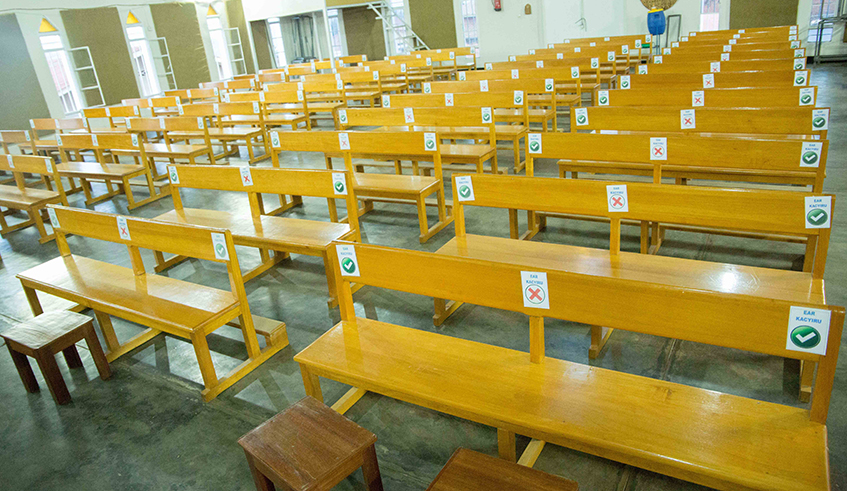

Churches, cathedrals, mosques, among other places of worship will once again host believers after almost four months of suspension as the country continues to contain the Covid-19 pandemic.
A cabinet meeting this week decided that these places of worship will resume services but each must be vetted by local authorities against set heath guidelines to ensure the reopening does not set the country back on the gains made towards containing the virus.
By Friday July 17 evening, a number of facilities had been inspected by the authorities, and were waiting for response on whether to go ahead and host services.
Many are hopeful the response will come ahead of Sunday when most Christian denominations congregate.
The New Times visited some facilities, as well as talking to some religious officials in regard to the preparedness to reopen.
For many, a sense of excitement is clear with anticipation of reopening, however, there is also some sweat as the places of worship brace for the ‘new normal’ in regard to how gatherings are going to be handled.
Besides facing increased budgets for buying sanitizers, soap, spray pumps among other equipment that are required in line with the government’s preventive measures, there will also be a change of gathering culture as we knew it.
For instance, on an odd note, mosques are going to be hosting two services on Friday – instead of the single service that the Muslims have been used to.
Speaking to The New Times, Sheikh Suleiman Mbarushimana the advisor to the Mufti said the move is aimed at respecting social distancing measures where mosques will only be hosting less than half of their congregants in each service.
In addition, just like other places of worship, mosques have already put in place a number of volunteers who will guide the people concerning washing hands, sitting arrangements, among other things.
According to Mbarushimana, a mosque will be having between three to seven volunteers depending on the size of their congregations.
This Friday, Muslims didn’t gather since they were still dealing with putting in place the necessary preventive measures.
For Christians, inspection of their worship facilities have been taking place positively, but it is not clear whether they will gather this Sunday or not.
With a number of preventive measures already in place in churches, the faithful who talked to The New Times painted for us the effect of "the new normal” as opposed to what we were used to.
"I just cannot believe we won’t be hugging one another, hold hands while praying for one another,” said Maya Nzeyimana, a worship leader at Christian Life Assembly in Gasabo District.
She however recognised that it is the way to go as we are in "an awkward period of time.”
Avoiding hugging and shaking hands in addition to keeping a distance of about one and a half metres between one congregant and another are some of the serious measures that places of worship must adhere to.
Stating that church life will be different due to preventive measures, Nzeyimana called upon people to learn to worship God no matter what the physical environment is.
Father Yohan Bosco Ntagungira who heads the Regina Parish of the Catholic Church (Remera –Gasabo) also spoke about the new changes his church is undertaking. Among these, believers now have to be used to wearing masks all through the service – even when singing!
Furthermore, when getting out of church after the service is done, the faithful will be required to go one bench at a time – as opposed to moving out in groups.
Behaviours like sharing of microphones and hymn books are some of those that are going to be halted during this period of time, while among other the measures, children under 12 years of age will not be allowed to go to church.
Gabriel Ngamije Semugeshi, a worship minister and founder of Christocentic Worship Ministry had a plea to make in regard to the use of masks when leading the singing in church.
"If it happens that they require us to sing with masks, it will in fact be a very serious obstacle. I would like to take this opportunity to ask the authorities if there is any way to allow the lead-singers to not have masks, but keep good distance and not share microphones (every singer having his own microphone in the service).”
Online congregation is still a useful option.
Brett Shreck the lead pastor at Christ Church Rwanda (CCR) said his church will be hosting one service on Sunday hosting about 50 people, and the rest of the members will watch online. Normally, CCR has the capacity of hosting up to 400 people, but due to social distancing guidelines, they cannot bring in the full number.
For making offertories, Shreck emphasized the use of mobile means.
Meanwhile he also said that Christians have been faithful in regard to offering even amidst the tough times of Covid-19.


